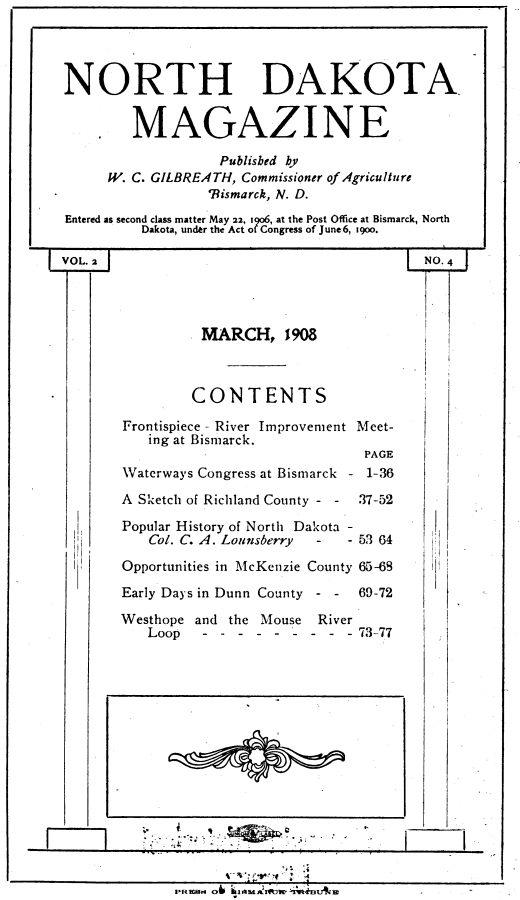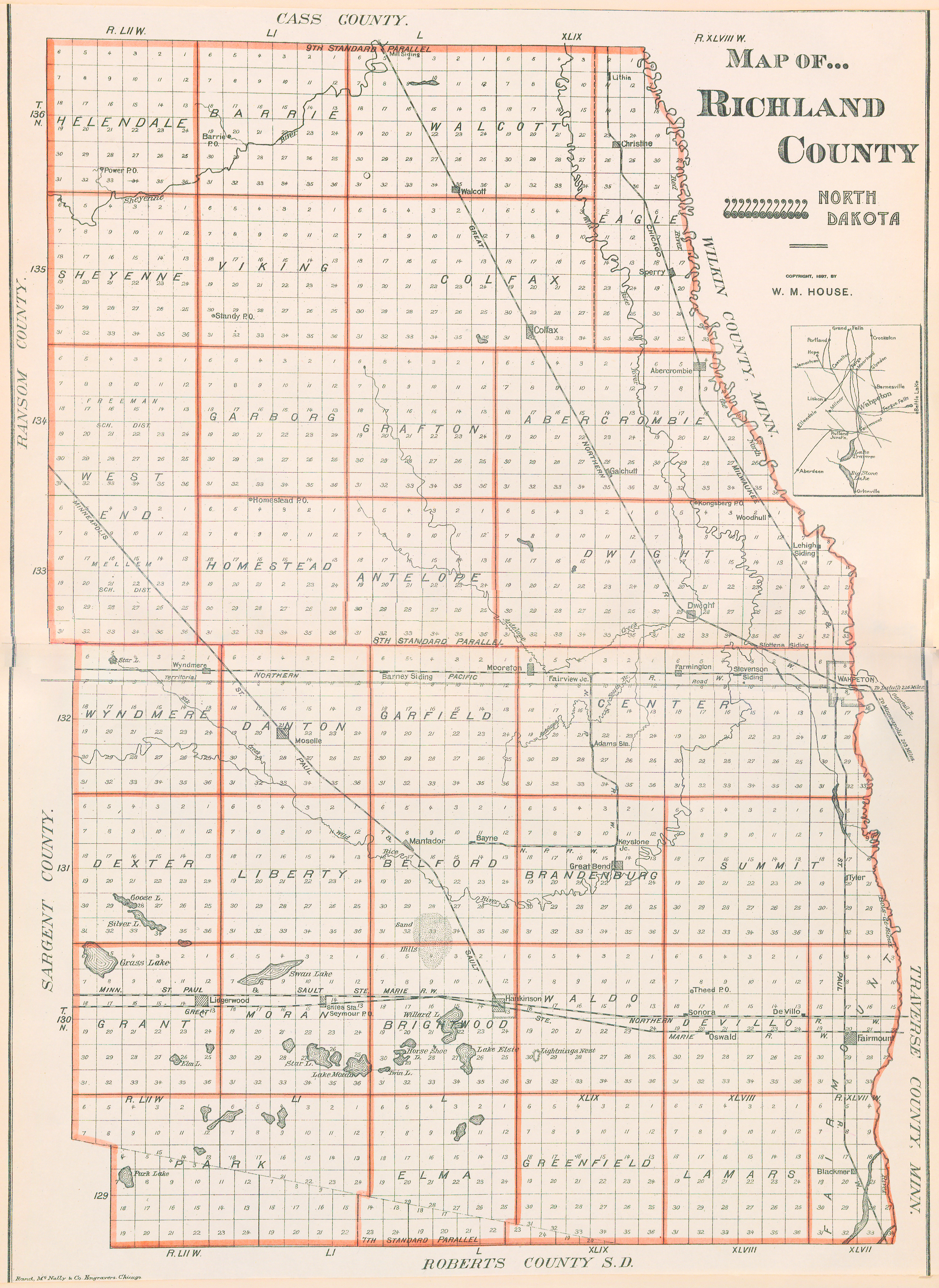A Sketch Of Richland County
The following article was extracted from the North Dakota Magazine, June 1907, which is available from Google Books.
HORACE B. CRANDALL, in the year 1886, compiled a history of Richland county, which was published by him at Colfax, Dakota Territory. This is a pamphlet of 150-pages, bound in paper, and only a few copies of it are now available. The history of Richland county proper is preceded with a brief history of the then Dakota Territory. The sketch was characterized by the same cheerful optimism that is abroad in the state today and it contains much data that is interesting in the light of our present development. This article was written in 1886.
Railroad Brings Many Settlers
In the year 1871, the railway, now called the St. Paul, Minneapolis and Manitoba, reached with its iron arms and commercial and hopeful interests the village of Breckenridge, now the county seat of Wilkin County, Minnesota, where the end of the western division was located, round-house and machine shops built that now remain, not, however, without the strong probability of their being moved over the river to Wahpeton, an event warmly cherished and discussed by live Wahpetonians.
This pioneer railway, reaching so far to the northwest from St. Paul, and then running north towards Queen Victoria's American possessions, afforded great advantages to the early settlers, and encouraged thousands to settle along its iron pathway and work up farms on the vast prairie lands of the great northwest, that would have remained for years untouched by the farmers' plow, and the soil and sod uncombed by his har row and drags.
Richland County Organizes in 1873
As heretofore stated, in the year 1871, the Manitoba railway touched the Red River valley at Breckenridge, and this hurried up the organization of Richland county, which took place in 1873, and the Indian titles in the county were extinguished. Governor Pennington, occupying the gubernatorial chair, appointed the county commissioners, designating the following named gentlemen : J. W. Blanding, chairman; D. Wilmot Smith, M. T. Rich.
The following officers were appointed to serve until the November election of said year (1873): Register of deeds, Hugh R. Blanding; treasurer, John Quincy Burbank; sheriff, William Root; county register and ex-officio county clerk, John M. Ruggles; assessor, Hans C. N. Myhra.
First Richland County Election
At the first election, in 1873, there was but one voting precinct, and that was Wahpeton, where the polls were opened and about sixty votes were cast. Reckoning the population at five for every voter, there was a population of 300 in the county at that time. The following officers were elected : County commissioners, John Smidt, chairman; Alex McCall, John Kotschevar; county treasurer and ex officio judge of probate, John Q. Burbank; county register and ex officio clerk, John M. Ruggles; county assessor, Hans C. N. Myhra; sheriff, Job Herrick; county superintendent of schools, John M. Ruggles; justices of the peace, S. H. Fowler, John Haslehurst, William Weiss.
Dakota Booms Begins
From the year 1873 up to the year 1879, the county of Richland was being filled up quite rapidly by persons from all sections of the country and representing all nationalities, especially during the years of 1877 and 1878. Wahpeton, during these years, by her desirable location and the exceedingly rich farming lands surrounding, enjoying as she did the benefits afforded by the Bois de Sioux and the Red rivers, was adding to her population that class of persons who have the ambition to go and get to the front, using their combined labors to make of sparse settlements villages, mould and erect cities, putting them on the great highway of prosperity by that public spirit without which the world would be a hive of drones.
The writer remembers very distinctly his first visit to Wahpeton in the spring of 1879, when the beginning of the boom for Dakota and its towns began to be felt very sensibly. We were out looking for land, having the description in our pocket.
Well do we remember meeting, for the first time, the county officers as they were sandwiched in their 9x9 courthouse, where elbow room was held at a premium. Not a single soul among them had a sad countenance, but all were affable and extended the right hand of fellowship and seemed anxious to talk about lands that were being offered cheap for cash. At this time the fathers of the town that I met were as follows: Messrs. Blanding, Ruggles, Haslehurst, Propper, Rich, Root, and others. They were all as well acquainted with the towns, ranges, sections and quarters as a bright schoolboy with his alphabet.
The land that I wished to look at was in the German settlement, in the vicinity of Lubinow's, I believe, and although it was rather late and the sun was sinking fast in the west, I inquired for a rig, and Smith De Silva was called as being ready for such jobs. We were soon on the move, and, when night overtook us, we were at the farm house of our mutual friend, Mr. L. J. Moore, one of the earliest settlers on the Wild Rice.
When we asked for lodgings, we found we could stay, but it might be a little noisy for us, as there was to be a dance there that evening; but our host informed us that there were beds in the granary, and we could occupy them. I saw instantly that De Silva, our guide, was pleased to think he had a good opportunity to trip the “light fantastic toe" to the sound of the violin, which he preferred rather than sleeping with his eyes open.
Of course we, being called a Methodist and being more advanced in years, left the company to their own enjoyment, and were soon under cover, half sleeping and waking in a kind of musical mood, thinking about the land that we were searching for. Our sleep for the night was good, the music perhaps acting as a lullaby for us, and we were ready for an early start in the morning, De Silva being already up and dressed and anxious to engage in an exciting day's work to keep the curtains from falling over his eyes.
Land Was too Far from Wahpeton
We swung around the circle in a somewhat zig-zag style, feasting our eyes on prairie lands as level and as rich as a garden, crossing and recrossing the Wild Rice, making a few calls, but generally finding the farmers gone, and, De Silva, not being a German linguist, and the writer ditto, by reason of which we could not always converse with the ladies, started for Wahpeton, concluding that the land was very rich, but too far from Wahpeton, and to market grain and secure fuel would be too much for any one who was a novice at farming.
As a result of our labors we found ourselves in Wahpeton that evening in time for the early train, no land purchased, and De Silva perfectly satisfied. He never gave us any credit for being the means of taking him to a country dance, but we parted as good friends and have never seen him to recognize him since, but understand he lives in Richland county and is a tiller of the soil.
Looking Back on Richland County Visit
This year we visited the section of the country that we visited at that time, and the change is wonderful. We have seen, of late, Mr. Moore, and he did not know that we were one of the 'twain that found comfortable quarters at his homestead on that occasion. It was a wonder to us where so many young people came from.
From the year 1879 up to this year, 1886, it is really wonderful what a change has taken place. Then the population of Wahpeton could not have been over 200 souls, all told; but the census for 1885 gives us nearly 2,000, and the county at large a population of over 9,000, a population, to be sure, strongly foreign in the country, but in the towns along the lines of our railways there is an increase of American nationality, a mixture that warrants great activity of brain and muscle for the future.

